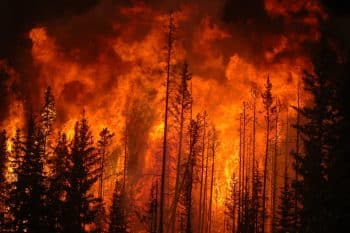Paul Street
A Strong Left Voice in Middle America

Alberta burning. (Cameron Strandberg)
[dropcap]S[/dropcap]ome time ago, the environmentalist “Break Free” movement planned a number of protest actions around the world during the first two weeks of May. The protests have a simple and basic message: burning fossil fuels is unsafe and those resources must be left in the ground.
“Break Free’s” timing, it turns out, was eerily perfect. In the early evening of Tuesday, May 3rd, an epic wildfire broke out southwest of the Northwest Canadian city Fort McMurray. The giant blaze resulted in the mandatory evacuation of 12 communities in the sub-Arctic city’s area, located in the province of Alberta.
A Horrific Scene
By 7 p.m., Fort McMurray was placed under a mandatory evacuation order. Record breaking temperatures, reaching 91 °F combined with low relative humidity and strong winds to fuel the fire’s rapid growth. By last night (I am writing on Sunday, May 8th), the wildfire covered an area of more than 700 square miles (2,000 square kilometers), including areas still on fire and areas already burnt. The destruction is epic. BBC reported on a Hellish scene two days ago:
“The flames have already caused the evacuation of 80,000 people from the oil city of Fort McMurray, and thousands are still stuck to the north…The wildfire…[is] being propelled by high winds to the north-east towards Saskatchewan and was expected to reach the province by the end of Saturday Smoke from the fire has already spread there, and air quality statements have been issued for both Saskatchewan and North-West Territory. ‘Fire conditions remain extreme,’ said the Alberta Emergency Management Agency late on Saturday.
There is the possibility of rain on Sunday and Monday, but officials say the fire can only be put out by sustained heavy rains.
The blaze has ruined entire neighbourhoods, with residents warned it could be some time before they can return. Officials say the power grid is damaged and the water not drinkable.
Some 1,600 homes and other buildings have been lost …Local DJ Chris Byrne was allowed back into Fort McMurray to check on the damage. He told BBC Newshour what he found. ‘Complete blocks [are] levelled and charred and it looks like a horrific scene.’”
The spectacle in northern Alberta is practically apocalyptic. The giant rolling firestorm has created its own thundercloud, replete with lightning that has helped spread the blaze.
The Fingerprints of Climate Change
What’s it got to do with fossil fuels? Quite a lot. Rachel Cleetus is the lead economist and climate policy manager for the Union of Concerned Scientists. She told CNN that climate change, which is driven by humanity’s excessive extraction and burning of carbon-rich fossil fuels, is “a significant factor” behind the momentous Canadian inferno. “We know the northern latitudes are warming faster than anywhere else….You definitely see the fingerprints of climate change,” Cleetus said.
According to CNN columnist John Sutter:
“A ridge in the jet stream, associated with rapid warming in the Arctic, also has helped lock in a high pressure zone over northwest Canada. That likely contributed to the fire conditions, experts said….Fires only are expected to get bigger and costlier as humans keep pumping heat-trapping gases into the atmosphere, primarily by burning fossil fuels for heat, electricity and transportation. A 2011 report from the U.S. National Academy of Sciences, for example, says certain parts of the American West could see up to a 650% increase in the median area burned by wildfires each year if temperatures rise another 1 degree Celsius. Humans already have warmed the climate about 1 degree Celsius compared with temperatures before the industrial revolution.”
“To avoid 2 degrees of warming, which world leaders say is the danger zone for climate change, society basically needs to ditch fossil fuels between 2050 and 2100 — a monumental task but one researchers say is achievable. …Meanwhile, wildfire seasons already are getting longer. In Alberta, the province where Fort McMurray is located, the fire season now officially starts in April, Flannigan said. It used to start in May. ‘In recent years we’ve actually had forest fires in December, which doesn’t have any historical analog,’ he told me….In parts of the western United States, there no longer is a ‘fire season.’ The entire year is now fair game. ‘Climate change has led to fire seasons that are now on average 78 days longer than in 1970,” the U.S. Forest Service said in an August 2015 report. ‘The U.S. burns twice as many acres as three decades ago and Forest Service scientists believe the acreage burned may double again by mid-century.’”
“We need to grasp where we come into the picture on fires like the one in Canada and plan accordingly. That means better fire management — including discouraging the growth of towns in fire-prone areas and creating emergency funds to help cash-strapped agencies fight these bigger, badder fires. It also, crucially, means working to eliminate fossil fuel use as quickly as possible” (emphasis added).
That’s a guy at CNN writing that – not Bill McKibben, James Hansen, or Naomi Klein being interviewed on Democracy Now!.
The Gateway to Canada’s Tar Sands Crime
I’ve saved the mostly darkly fitting fact of the Canadian wildfire story for last. If you’ve read this far you probably already know this but it must be noted here anyway: Fort McMurray is a remote boomtown with a rapidly rising population and business activity driven primarily by the extraction of Canadian tar sands oil. The city is smack in the heart of one of Canada’s leading centers of planet-baking oil production, right beneath the Athabasca Oil Sands, whose dirty and exceptionally carbon-rich oil is extracted on a giant scale by great eco-cidal and transnational Big Carbon firms including Syncrude, Suncor Energy, CNRL, Shell, and Nexen. Fort McMurray, named after a factor (William McMurray) with the fur-trading, merchant-capitalist Hudson Bay Company in 1870, is “the gateway to Canada’s oil sands region, a hotbed of fossil fuel extraction” (Sutter).
It is also surrounded by vast swaths of primeval northern “tiaga” boreal forest, ready for burning in the hot and crispy climate brought to us by 71 years of extreme global petro-capitalism. The burning and forest destruction becomes a cause as well as a consequence of anthropogenic (really capitalogenic) global warming.
Like Hurricanes Katrina (2005) and Sandy (2012) and numerous other climate-related. not-so natural disasters, the Canadian Wildfire of 2016 is yet another attempt by Mother Nature (I write on Mother’s Day) to wake humanity up to the deadly costs of the fossil fuel addiction imposed on it by – and this is something you won’t hear on CNN or for that matter from McKibben or Hansen (you can hear it from Klein) – the ruling class masters of capital [1]. We cannot depend on the carbon-caked corporate and financial powers that be or their growth- and accumulation-addicted profits system to help us avert environmental catastrophe, which is unfolding before our very eyes and not just those of “our grandchildren.”
Notes
1. For elaboration on this very critical point, please see Paul Street, “Anthropocene or Capitalocene?” teleSur English, October 27, 2015 and, above all, the brilliant Marxist environmentalist geographer-historian-sociologist Jason Moore’s book Capitalism in the Web of Life: Ecology and the Accumulation of Capital (Verso, 2015).
 Independent radical-democratic policy researcher, journalist, historian, author and speaker based in Iowa City, Iowa, and Chicago, Illinois. He is the author of seven books to date, including: Empire and Inequality: America and the World Since 9/11 (Boulder, CO: Paradigm, 2004); Racial Oppression in the Global Metropolis: a Living Black Chicago History (New York: Rowman & Littlefield, 2007); The Empire’s New Clothes: Barack Obama in the Real World of Power (Paradigm, 2010); (with Anthony DiMaggio) Crashing the Tea Party: Mass Media and the Campaign to Remake American Politics (Paradigm, 2011); They Rule: The 1% v. Democracy (Paradigm, September 2014). His essays, articles, reviews, interviews, and commentaries have appeared in numerous outlets political, media, and academic. Visit his website, Paul Street
Independent radical-democratic policy researcher, journalist, historian, author and speaker based in Iowa City, Iowa, and Chicago, Illinois. He is the author of seven books to date, including: Empire and Inequality: America and the World Since 9/11 (Boulder, CO: Paradigm, 2004); Racial Oppression in the Global Metropolis: a Living Black Chicago History (New York: Rowman & Littlefield, 2007); The Empire’s New Clothes: Barack Obama in the Real World of Power (Paradigm, 2010); (with Anthony DiMaggio) Crashing the Tea Party: Mass Media and the Campaign to Remake American Politics (Paradigm, 2011); They Rule: The 1% v. Democracy (Paradigm, September 2014). His essays, articles, reviews, interviews, and commentaries have appeared in numerous outlets political, media, and academic. Visit his website, Paul Street
Note to Commenters
Due to severe hacking attacks in the recent past that brought our site down for up to 11 days with considerable loss of circulation, we exercise extreme caution in the comments we publish, as the comment box has been one of the main arteries to inject malicious code. Because of that comments may not appear immediately, but rest assured that if you are a legitimate commenter your opinion will be published within 24 hours. If your comment fails to appear, and you wish to reach us directly, send us a mail at: editor@greanvillepost.com
We apologize for this inconvenience.
 Nauseated by the
Nauseated by the
vile corporate media?
Had enough of their lies, escapism,
omissions and relentless manipulation?
Send a donation to
The Greanville Post–or
But be sure to support YOUR media.
If you don’t, who will?


